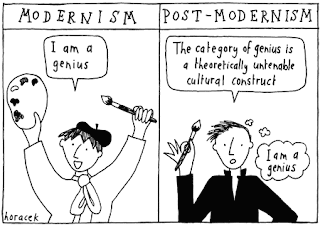Pastoring in Postmodernism
Pastoring a postmodern generation presents several unique challenges and opportunities. It is essential that we equip ourselves with knowledge about postmodernism so that we can better cater to the needs of a postmodern mindset. Grenz(1996) outlined the movement from modernity to postmodernity in history, and stated several characteristics of postmodernism. These include deconstruction, the destruction of ontology(Derrida), the use of power to assert knowledge(Foucault)and the non-existence of truth. Both knowledge and truth are not objective; they are relative. The world is “relative, indeterminate and participatory”. Meaning is made in society within community using language, hence truth is what fits within a specific community. This topic on postmodernism fascinates me because it gives me a greater insight into how people and the world in general thinks, and what shapes their beliefs and actions. It helped me make sense of what I have already experienced when I talk to non-believers about Christianity, as it seems that some of the most common comments I face is that "Christianity may be true for you, but it is not true for me.”, or “Christianity is too exclusive in its claim that Jesus is the only way. Why can’t you tolerate and respect other religions too?"
Grenz(1996) made a few suggestions for how the gospel can still be made relevant in a postmodern age. A ‘postmodern gospel’ would have to be ‘post-individualist, post-rational, post-dualistic and focused on spirituality’. Weiler(2000), picked up the thread and used Grenz’ suggestions to analyse characteristics of Pentecostal postmodernity, and found several traits that were similar to Grenz’ ‘postmodern gospel’. For example, post individualism focuses on being community-based and community-oriented. Pentecostal churches usually emphasise on community, fellowship and belonging such as having small groups, interest-based groups and ministries that people can find a second family in. Another example is that Pentecostals tend to more experience-based and practice-oriented, which reflects a postmodern approach.
The implications of a postmodern mindset on Christianity can be seen in the way we do outreach and discipleship. We need to redefine apologetics as people are asking different questions and coming from a postmodern perspective. One example is the Star Bar outreach ministry which we run in the city every week which I am actively involved in. We started it with the intention to create community in the city, as well as to reach out to the unchurched. One of the direct ways we do this is by offering the Alpha course. Alpha is catered to the postmodern generation as it is a community focused activity, where people gather around food and converse about important life questions. It is basically a conversation. People are generally open to hearing about what we have to say, and we have come across all sorts of people with different world views and faith persuasions.
Our weekly Star Bar events which includes Conversation Classes, Drink Socials, Alpha and Discovering Christianity courses
However, sometimes it does frustrate me when I have to say ‘what does this mean for you?’ when I already know the truth, which is based on the bible. If Jesus is the only way to salvation, that means the same for everyone in the world, not just for me. Also, how can they articulate something that they don’t know much about? Nonetheless, it is critical that we learn how to engage with a postmodern generation, and the one benefit of postmodernism is that people tend to be open of what we have to share. We just have to facilitate meaningful conversations, create community and pray that the Holy Spirit will do His job of convicting them of the Truth.
References
Grenz, S. A Primer on Postmodernism. Grand Rapids, Michigan: Eerdmans, 1996, 1-10.
Weiler, Peter T. “Pentecostal Postmodernity? An Unexpected Application of Grenz’s Primer on Postmodernism.” Australasian Pentecostal Studies 2/3, (March 2000): 51-61.






Comments
Post a Comment